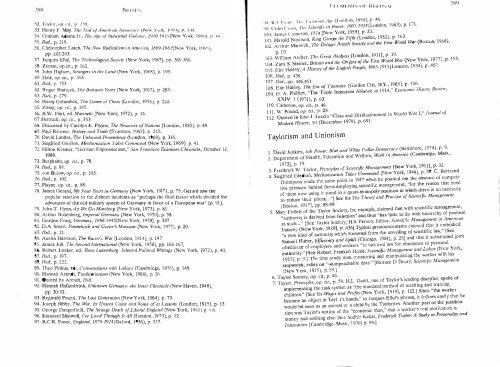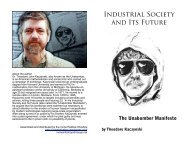CONTENTS - ouroboros ponderosa
CONTENTS - ouroboros ponderosa
CONTENTS - ouroboros ponderosa
Create successful ePaper yourself
Turn your PDF publications into a flip-book with our unique Google optimized e-Paper software.
,(0)) ,. T,lylm, op. ("if., p. J..IK.<br />
'<br />
53. Henry I; " May 'IhI ' . F . Il( I U if /11I(,I"Wall I<br />
J"I/(J(:('llt'r (Nt'\\' YOlk , liJVi) . , p . . 114 - .<br />
. ;<br />
5 4. Grnham Adams lr "' Th,. ' A g{ ()) .rj f1(I us!naI Vio{[,!lC/', jl)j() Nl'i(Ncw York J9(()<br />
· 5" j. IbI 'd 'J p. 219.<br />
56. Christopher Lasch, Tltr. Ne.w Radicalism in Amnica ' 1889-1963(Ncw York, It)(l.'I ),<br />
pp. 202-203.<br />
57. Jacques Ellul ' The - T, Poe hno ioglca ' IS OClcty · (New York ' 19(7) , pp . . 365 - -. 36' ) \J .<br />
_<br />
::,8. Zeman, or.cit., p. 162.<br />
' "<br />
> • , • 222.<br />
.<br />
' )), p. II<br />
59. John Highm, Strangers in fhe Land (New York, 19(8) ,P ,<br />
60. Ha!e, up. elf., p. 163.<br />
195.<br />
61, Ibid" p, 153<br />
62. Rc ,gcr Shattuck, The Banqun Ye an (New York, 19(7) ' p . 28 3.<br />
.<br />
63. /bul., p. 279.<br />
64. !"larr:r Golumbek, The. Game a/ Chess (london 19)4) p<br />
65. ZweIg, op. (:il., p. 195.<br />
G6. R.W. Flint, ed. Marinerti (New York, 1972), P . 14.<br />
67 Shauuck, op. cit., p. 353.<br />
68 Discussed by Carolyn E . PI ayne, Th I" M!umses of Nations (London ' 1925) , p . 49 .<br />
.<br />
69' , P auI<br />
R' lCotUr, Hwory and Truth (Evanston 1%5) p 213<br />
.<br />
70 ' DavId . . La n d es, 'rl 1 ,le lfnhound Prome!heus<br />
(Lon on " 1969) , p . 316 .<br />
. .<br />
d<br />
71 Siegfried ("ar II ' Ion, M ec h amzullOn Takes Command (New Y rk " 1969) p. 41 .<br />
o<br />
72· . Hilton ' Kramer ' "German Ex , pressloillsm, " " .san . Francisco T'.Xaminer-Chronicle7 October 12,<br />
1980.<br />
73. Berghahn, op . cit., p. 78.<br />
74. Ibid., p. 81 ,<br />
75. Yon Bu[ow, op. dt., p. [03.<br />
70, Ibid,. p, 102.<br />
77. Playne, op. cit., p. 88.<br />
78. James Gerard Mu F }'j<br />
. G<br />
, J our ears In ermallY (New York > t917) , p. 75 . G erar d saw [he<br />
popular reaction to the Zab ern mCI " d cnts as " perhaps the f' ma 1fae t or w h' Ie h decided the<br />
.<br />
advocates of Ihe old milita r) 's Y s(e m of Germany 10 favor of a European war" (p. 91) .<br />
79. John T . Fl ynn, As W.<br />
.<br />
I" Go Marchmg (New York 1973) 81<br />
SO. Arthur Ros nberg, impenal Ge.nnany (New YOk, 1970f p.<br />
e: 58.<br />
8 1. Gordn Cnllg, Gf'-rmany, 1866-1945(New . York ' 1978) , p. 337 .<br />
.<br />
82. D.!\. Smart ' Pannelwe.k . . an d G OTter s Mar:nsm (New York, 1977) . , p . 20 .<br />
03 Ib'd<br />
o . I ., p. 21.<br />
. J<br />
84. Austin Harrison, TJu Ka iser's War (London 1914) p 197<br />
amcs Jail, The Second International (New York, 1956) pp. 166-167<br />
· Robert<br />
Looker, ed ROl'a Luxembu . . . '<br />
,<br />
18· S eute l d Polmeal Writings (New York, 1972), p. 40.<br />
87. Ibid., p. 197. "<br />
88. Ibid., p. 222.<br />
,<br />
89 · The 0 p. mkus, ed., Coner.sa!lolIs with Luk(ICS (Cambridge 1975) , p. 1 48.<br />
90. Hannah Arendt, Totahrarianism (New York " 1968) p . 26' J.<br />
91. Quoted by Arendt, Ibid.<br />
92. Hannah Hafkesbrink ' Unknown G mnany: An inner Ch ronicle (New Haven, 1948),<br />
pp. 30-32.<br />
93. Reginald Pound, The ost Gme.rarion (New York 1964) p 73 .<br />
L ' .<br />
94. Joseph Bibby, The. War, Its Unseen Cause and S if"<br />
95. eorge Dangerfield,<br />
Thp. Strange Dr.ath of Liber;(d<br />
,<br />
L s<br />
[:,::; L o n , 91<br />
don<br />
k 1 5) . .<br />
or , 1961) p. Vlll. p<br />
96. Eman uel Shmwcll, I've Lived Through II All (London ' 1973) ,p 12<br />
97. R.C.K. Enor, England, 1870-1914 (Ox[ord, 1936), p. SS7. . .<br />
.<br />
12<br />
I·" , ·.MI ·NI:-' III· 1< 1+1 /\,\1<br />
'JK, ILL I '\'.111'. /I,.' ! 'It'lm;(01 /l,!W (I Hudon, 19)0), p. 46.<br />
1)'1. ('oliu ('IOSS , 'lJ1I· I.iI}('ral.\· in Power, 1905-1914 (London, 1(63), p. 171.<br />
lOll. James {:'1Itll.:ron, 1':)i4 (New York, 1959), p. 21.<br />
101. Harold Nicolson, King Geo'1:e the Fifth (London, 1952), p . 163.<br />
102. Arthur Marwick, The Deluge: British Socir.ty and lhe First WorM War (Roston, 19(6),<br />
p, 10,<br />
103. William Archer, The Great Analysis (London, 1911), p. 19.<br />
104, Zan S. Steiner, Britain and the On'gins of the. First World War (New York, 1977), p. 153.<br />
lOS. Elie Halev)', A History of the. £fl8li.h People, 1905-1915(London, 1934), p. 457.<br />
106. Ibid., p. 436.<br />
107. Ibid., pp. 446,45 1.<br />
109. Elie Halevy, The Era of Tyrannie' (Garden City, N.Y., 1965), p. 106,<br />
109. G. A. Phillips.. "The Triple Industrial Alliance in 1914," Economic History Rf':vit'w,<br />
XXIV J (1971), p, 63,<br />
110. Camcron, op. cit., p. 46.<br />
111. V.i. Pound, op. Cil., p. 28.<br />
12. Quoted in Eric J. Leed's "Class and Disillusionment in World War I," Journal of<br />
1<br />
Modf.m iILI·tOry, so (December 1978), p. 691.<br />
Taylorism and Unionism<br />
1. David Jenkins, lob Power: Blur. and White Collar Democracy (Baltimore, 1974), p. 9.<br />
2. Department o[ Health, r:d ucation and Welfare, Work in America (Cambridge, Mass.,<br />
1973). p, 19,<br />
3. Frederick W. Taylor, Principles of SCientific Ml1nagemt'fli (New York, 19l1), p. 32.<br />
4. Siegfried Giedion. Mechanization Takes Command (New York, 1945), p. 38. C. Bertrand<br />
'Thompson made the same point in 1917 when he pointed out the absence of compeli<br />
tive pressure behind firms employing scientific management, "for the reason that most<br />
of them now using it stand in a quasi-monopoly position in which there is no neces:>ity<br />
to reduce their prices .... "] See hi!; The. Theory and Prar::lice of SCientific Management<br />
(Bostoll, 1917), pp, 88-89,<br />
5. Mary Follett of the Taylor Society, for example, claimed that with scientific management,<br />
"authority is derived from function" and thus "has little to do with hierarchy of position<br />
as such .... " {Sec Taylor Society, H.S. Person, Editor, Scie.ntific Manage.ment in Amoican<br />
Induslry (New York, 1929), p. 436] Typical pronouncements claimed that it embodied<br />
"a new kind of authority which stemmed [rom the unveiling of scientific law," lSee<br />
Samuel Haber, l:.Jflci(lU:Y and Up lifl (Chicago, 1964), p. 25] and that it substituted joint<br />
obedience o[ employers and workers "to fact and law for obedience to personal<br />
authority." [See Robcrt Franklin Hoxie, Scimlific Management and Labor (New York,<br />
1915), p. 9.] The time-study man, measuring, and manipulating the worker wi th his<br />
stopwatCh, relies on "unimpeachable data." {Horace D Drury, Scimrific Manageme.nt<br />
(New York, 1915), p. 59.J<br />
6. Taylor Socicty, op. cit, p. 46.<br />
7. Taylor, Prineiplr.s, op. cit., p. 59. RL. GoOU, one of Taylor's leading disciples, spoke of<br />
implementing the task system as "the standard method of teaching and training,<br />
chi[dren." lSec his Wagl's tJ.nd Profits (New York, 1919), p. 122.} Since "the worker<br />
became an object in Taylor's hands," in Jacques Ellul's phrase, it follows easily that he<br />
would be seen as an animal or a child by the Tayloritcs, Another part of the justifica<br />
tion was Taylor's notion of the "economic man," that a worker's real motivation is<br />
money and nothing else. !See Sudhir Kakar, Frede.rick Taylor: A Study in P(>onality and<br />
lnnovation (Cambridge, Muss., J970) p. 99.J






